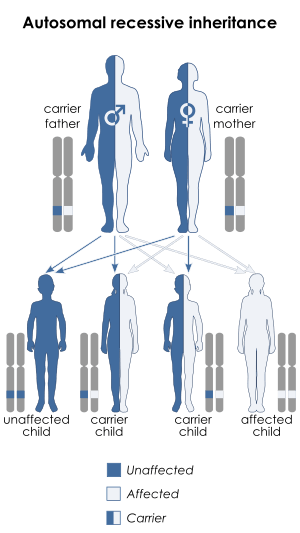Galactosialidosis
Galactosialidosis is a lysosomal storage disease.[2] This condition is rare and most cases have been in the juvenile/adult group of patients. An infantile form has been described.
| Galactosialidosis | |
|---|---|
| Other names | Neuraminidase deficiency with beta-galactosidase deficiency[1] |
 | |
| Galactosialidosis is inherited in a autosomal recessive manner | |
| Specialty | Endocrinology |
Molecular biology
It is associated with cathepsin A.[3] This disease is due to mutations in the CTSA gene which encodes the protective protein/cathepsin A (PPCA).[4] This in turn leads to a secondary deficiency of beta-galactosidase (GLB1) and neuraminidase 1 (NEU1).There are three distinct CTSA isoforms.
Diagnosis
A prenatal diagnosis was made by Kleijer et al. in 1979 by measuring beta-galactosidase and neuraminidase activities in cultured amniotic fluid cells.[5]
Treatment
References
- RESERVED, INSERM US14-- ALL RIGHTS. "Orphanet: Galactosialidosis". www.orpha.net. Retrieved 11 April 2019.
- Koike K, Hamaguchi T, Kitamura H, Imasawa T, Joh K (2008). "Galactosialidosis associated with IgA nephropathy: morphological study of renal biopsy". Pathol. Int. 58 (5): 295–9. doi:10.1111/j.1440-1827.2008.02226.x. PMID 18429828.
- Kleijer WJ, Geilen GC, Janse HC, et al. (1996). "Cathepsin A deficiency in galactosialidosis: studies of patients and carriers in 16 families". Pediatr. Res. 39 (6): 1067–71. doi:10.1203/00006450-199606000-00022. PMID 8725271.
- Caciotti A, Catarzi S, Tonin R, Lugli L, Perez CR, Michelakakis H, Mavridou I, Donati MA, Guerrini R, D'Azzo A, Morrone A (2013). "Galactosialidosis: review and analysis of CTSA gene mutations". Orphanet J Rare Dis. 8 (1): 114. doi:10.1186/1750-1172-8-114. PMC 3737020. PMID 23915561.
- Kleijer, W. J.; Hoogeveen, A.; Verheijen, F. W.; Niermeijer, M. F.; Galjaard, H.; O'Brien, J. S.; Warner, T. G. (July 1979). "Prenatal diagnosis of sialidosis with combined neuraminidase and beta-galactosidase deficiency". Clinical Genetics. 16 (1): 60–61. doi:10.1111/j.1399-0004.1979.tb00851.x. ISSN 0009-9163. PMID 477017.
This article is issued from
Wikipedia.
The text is licensed under Creative
Commons - Attribution - Sharealike.
Additional terms may apply for the media files.